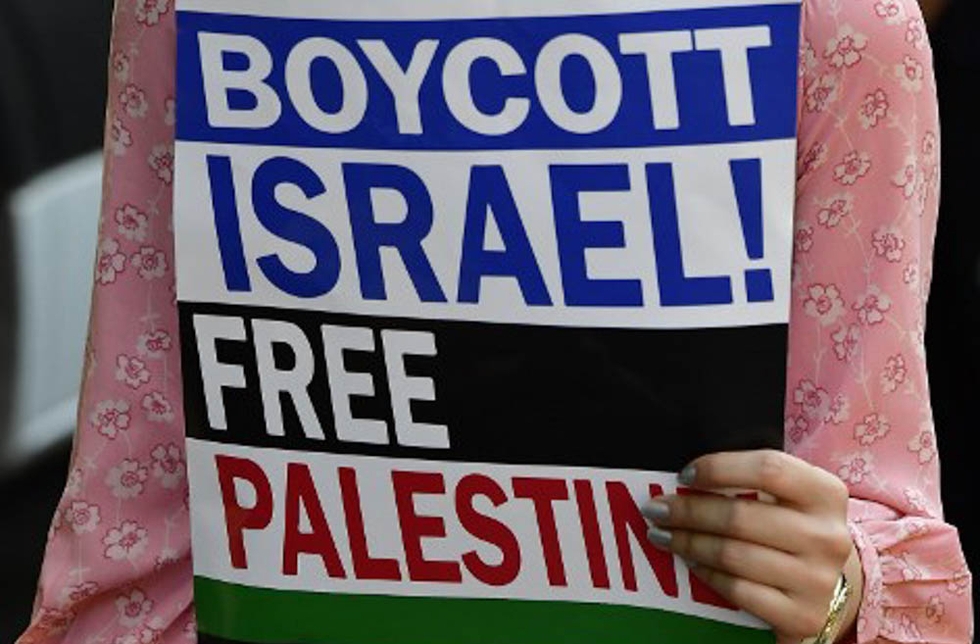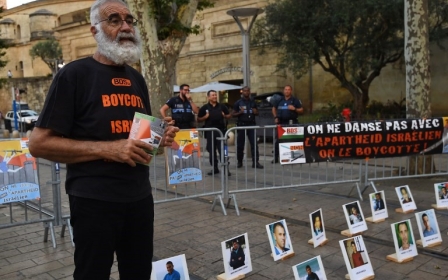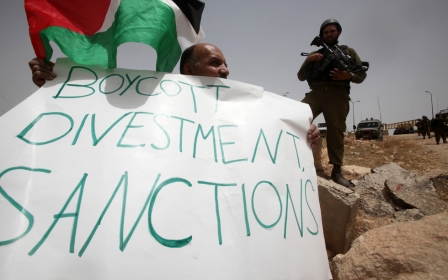Anti-BDS bill: For Israel, the terrain is shifting unfavourably

A battle over efforts to suppress the Boycott, Divestment and Sanctions (BDS) campaign has become headlines news in the United States, in the context of an ongoing federal government shutdown.
Last Thursday, the Senate failed for a second time to advance a bill that includes "The Combating BDS Act" legislation giving cover to states that penalise businesses and individuals who participate in boycotts against Israel and Israeli settlements in the occupied Palestinian territory.
The main obstacles
While the Democrats have refused to back any legislation before the federal shutdown is resolved, a third attempt to advance the anti-BDS legislation is expected. Democrat Senator Bob Menendez has said that the bill “will come back and it will have very strong bipartisan support”.
Despite opposition, the anti-BDS bill may, ultimately, become law. But those pro-Israel advocacy groups, such as AIPAC, pushing such initiatives have faced – and will continue to face – three significant obstacles in their efforts to make an exception of Palestine and Palestinian human rights.
Pro-Israel advocacy groups have faced – and will continue to face – three significant obstacles in their efforts to make an exception of Palestine and Palestinian human rights
First is the cultural and constitutional commitment to freedom of speech in the United States. Such is the strength of this commitment that even some passionate opponents of BDS are vocally opposed to the criminalisation of the boycott campaign.
A significant element of the opposition to the bill has come via the American Civil Liberties Union (ACLU), with the veteran organisation denouncing what it has called “a measure intended to suppress protected political expression”.
While the ACLU has repeatedly stated that it takes “no position on Israel boycotts, the BDS movement or the Israeli-Palestinian conflict”, the organisation has maintained that “states should not be sanctioning businesses on the basis of First Amendment-protected expression and association”.
Palestinian activism
When bill sponsor, Senator Marco Rubio, defended the initiative by rejecting claims it was about free speech, this merely invited a public dressing down on his understanding of the constitution. A second obstacle for those seeking to criminalise BDS is the fact that boycott has a long tradition and history in the US as a form of popular protest and civil society mobilisation.
As the ACLU wrote: “Political boycotts, including boycotts of foreign countries, have played a pivotal role in this nation’s history – from the boycotts of British goods during the American Revolution to the Montgomery Bus Boycott to the campaign to divest from apartheid South Africa."
In targeting BDS, pro-Israel groups have to make the case that Palestinians are not worthy of the same human rights as other people
Amjad Iraqi, writing in London Review of Books last July, cited an even wider tradition that includes “the Swadeshi movement’s boycott of British goods in India”, “the economic boycott of Nazi Germany” by European and American Jewish organisations in the 1930s, and the Delano Grape Strike in California in the 1960s”.
Iraqi correctly noted how “Israel insists that the Palestinian cause can’t be included in the venerable history of boycotts”. This means that Israel and pro-Israel advocacy groups have to argue that BDS is "different" – a task made harder by a third obstacle to the anti-BDS crackdown: Palestinian activism.
Dehumanising Palestinians used to be easier - and it is still all too common – but decades of deeply rooted, civil society activism by Palestinian Americans and their allies is bearing fruit, with support for Palestinians increasingly expressed in the mainstream spaces of media, culture and politics.
Shifting terrain
As I describe in my book, Cracks in the Wall: Beyond Apartheid in Palestine/Israel, one manifestation of these changes is the polarisation between Republican and Democrat voters over Israel and the Palestinians, with liberals and progressives being increasingly alienated from Israel.
These changes are no longer restricted to the grassroots. As The New York Times reported ahead of the Congressional mid-terms, newly elected representatives Alexandria Ocasio-Cortez, Ilhan Omar, and Rashida Tlaib have all “dared to breach what has been an almost inviolable orthodoxy in both political parties”, namely “strong support for Israel”.
“Running on platforms that emphasize opposing discrimination against marginalized groups," the paper added, “candidates have introduced the Palestinian issue as what they call a larger commitment to social justice."
Writing in Israeli newspaper Haaretz last week, correspondent Amir Tibon highlighted a “challenge” facing “Israeli diplomats and groups like AIPAC” in “the current political environment” – “the growing ‘progressive wing’ within the Democratic Party which is very critical of Israel, and now includes two members of the House of Representatives who openly endorse BDS”.
This is not to deny the very considerable energies being put into fighting the BDS movement at both state and federal level – not to mention the repression and censorship experienced by students and faculty at universities. And, to reiterate, this latest legislative effort may even ultimately be passed.
But the obstacles faced by those leading the legislative fight against BDS in the US are evidence that for Israel, long used to getting its own way, the terrain is shifting unfavourably.
- Ben White is the author of Israeli Apartheid: A Beginner's Guide and Palestinians in Israel: Segregation, Discrimination and Democracy. He is a writer for Middle East Monitor and his articles have been published by Al Jazeera, al-Araby, Huffington Post, the Electronic Intifada, the Guardian's Comment is Free and more.
The views expressed in this article belong to the author and do not necessarily reflect the editorial policy of Middle East Eye.
Photo: A protester holds a sign promoting BDS on 9 June 2018 in Berlin (AFP)
Middle East Eye propose une couverture et une analyse indépendantes et incomparables du Moyen-Orient, de l’Afrique du Nord et d’autres régions du monde. Pour en savoir plus sur la reprise de ce contenu et les frais qui s’appliquent, veuillez remplir ce formulaire [en anglais]. Pour en savoir plus sur MEE, cliquez ici [en anglais].






